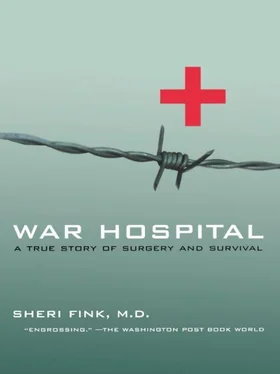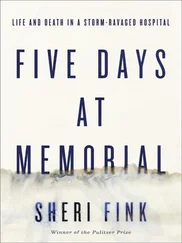Medicine and the war in Bosnia, I discovered, were intricately intertwined. In Bosnia, doctors, aid workers, and patients, in spite of their “protected” status under international law, became the earliest and among the most regular targets of war. Conversely, several physicians instigated and led the war’s campaigns of “ethnic cleansing” and genocide. And finally, at times aid efforts paradoxically stood in the way of more decisive actions to bring peace and were used as shameful cover for international failure and inaction on diplomatic and military fronts. It took the killing of most of Srebrenica’s adult male population, the largest massacre on European soil in nearly half a century, to move the powerful nations of the world to action.
* * *
THE STORY OF SREBRENICA AND ITS DOCTORS so impressed me that I spent the next four and a half years pursuing its details. What happened when doctors—community leaders used to having the power to fix things—realized that bandaging patients’ wounds did nothing to address the root causes of their suffering? Were the ethics of medicine in wartime truly identical to the ethics established for peacetime? Did the international conventions protecting and governing the practice of medicine and delivery of aid need updating in this post–Cold War–type conflict? These were some of the questions I set out to answer. Because enemy forces had overtaken the town, including the hospital, dispersing or killing all of its medical workers and patients, my work involved combing Bosnia and the world for survivors and sneaking around Srebrenica’s abandoned hospital in pursuit of a story that gripped me ever more tightly.
What I found in Bosnia was a story of individual doctors that highlighted, clarified, and personalized a war so many people outside found confusing and that offered insights into larger questions about how “regular people” with no conscious desire to fight (with, in fact, a sacred pledge to sustain life) were caught up and participated in war. I chose to reconstruct a narrative from the perspective of several doctors—Bosnian Muslim, Bosnian Serb, and international from Doctors Without Borders—whose individual backgrounds, personalities, and beliefs led them into and out of the war zone at various times, responding in very different ways to the challenges that faced them. What linked them, besides the three-story Srebrenica Hospital building, was their confrontation, at least once, with that ultimate doctors’ dilemma—whether to serve their patients or save themselves.
These individuals offered hundreds of hours of their time, recalling in great detail the most difficult days of their lives. I was most surprised by the extent to which their work influenced the war itself. Doctors mixed medicine with advocacy, community organizing, and politics. Some—with the painful conviction that they could save more lives by taking lives—shook off their white coats, picked up guns, and turned themselves into fighters. Here is their story.
PART ONE
BROTHERHOOD AND UNITY
There was a time when meadow, grove, and stream,
The earth, and every common sight,
To me did seem
Apparell’d in celestial light,
The glory and the freshness of a dream.
It is not now as it hath been of yore;—
Turn wheresoe’er I may,
By night or day,
The things which I have seen I now can see no more.
—William Wordsworth (1770–1850)
Ode, Intimations of Immortality from Recollections of Early Childhood
For men to plunge headlong into an undertaking of vast change, they must be intensely discontented yet not destitute, and they must have the feeling that by the possession of some potent doctrine, infallible leader or some new technique they have access to a source of irresistible power.
—Eric Hoffer,
The True Believer
THE NURSE’S HANDS FLUTTER AROUND THE PATIENT, but the doctor just stands and stares. He squeezes his right fist around the white cloth he used to dry his hands, crushing it, and then opens his hand, finger by finger. Squeezes. Then opens.
A technician bending over the patient straightens, wiping his bare hands on his white coat. Another leans over to fillet the patient’s blue jeans with a pair of scissors.
Summer sunlight floods through the large, wood-trimmed window and pools on the patient’s right leg. The knee looks normal. But the swollen, blotchy skin below it leads to a foot mummified in layers of bloodstained, torn bed sheets. The medical technicians begin unwinding the improvised bandage.
Dressed in a white gown, round face and brown sideburns capped by a blue paper hat, thirty-two-year-old Dr. Ejub Alić stands back from the table. A man taping the operation with a camera powered by a car battery softly begins to narrate. It is July 17, 1992, at 2:50 P.M. The hospital in Srebrenica, Bosnia, closed for the first three months of war, reopened only five days ago. And Ejub, a pediatrics resident accustomed to treating kids’ sore throats and earaches, is being asked to amputate a young man’s leg. He watches the nurse pull off the last cloth strip, baring the full, damning evidence of the injury to everyone’s eyes and nostrils. An exploding mine has bitten off the bottom of the foot and left two flaps of skin yawning around the patient’s missing heel. During the time it took for the patient’s family to get him here, arranging for a horse and cart and driving through a dozen miles of mountainous territory partly held by the enemy, bacteria have digested the remains into a tangle of blackened sinews.
There is no monitor here, but Ejub doesn’t need one to tell him that the heart of this patient—not much more than a boy, really, twenty years old, lying on the orange cot still in his jeans and beige T-shirt—is beating quickly. Blood loss, fever, raw fear. The patient’s well-defined muscles evince the three months he’s spent hefting a rifle and ammunition around the hilly, forested, some would say backward, border country of eastern Bosnia. When war exploded on the eve of Bosnia’s independence from Yugoslavia and Serb nationalist forces quickly took control of two-thirds of the republic’s territory, this young Muslim man picked up a hunting rifle and fought to protect his family’s village east of Srebrenica. So far he has helped save its citizens from the fate suffered by thousands of Muslims throughout Bosnia—deportations, imprisonment in concentration camps, executions, and massacres.
The young man’s pallor gives him a weakly appearance. He has curled his left arm to his chest, as if bracing himself, and on his wrist, a large, steel-colored watch ticks away the time. Someone has draped a small towel over his eyes, shielding him from the sight of what will come.
A nurse bends over the leg and shaves it with bare hands and a serious expression, ignoring the putrid smell. A tendril of dark hair escapes her blue cloth cap and curls beneath the birthmark on her left cheek. When she finishes, Ejub repeats her work, picking up the razor and inching it up from the blue, livid ankle to the pink, healthy thigh, postponing the inevitable moment when his scalpel will meet skin. Neither he nor any of the handful of doctors who have, over the past few days, made their way from islands of neighboring “free” Bosnian territory to the town of Srebrenica has experience as a surgeon. Ejub cannot recall surgery ever having been performed in this small, Spartan hospital, where women used to come to give birth before the war. No, Ejub is no surgeon, has never aspired to be a surgeon. Although he has talent for fine manual work—he practices woodcarving—his short, chubby fingers make performing even some non-surgical medical procedures difficult. But now he has war experience, having worked as the sole doctor in a nearby Muslim village that was isolated for the war’s first three months. Here, there is no one any better qualified than he, and if he doesn’t try to do something, this young man will most certainly die.
Читать дальше












